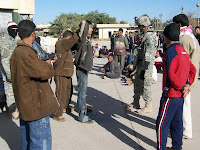 Rumors started to move through the crowd even before we entered the building. Once inside, they were confirmed. High winds in Tikrit had grounded the helicopters, and the show was canceled. Instead, we were greeted to a ten minute "pep talk" by the Chairman of the Joint Chiefs of Staff, Admiral Mullen, who reassured us that he received briefings on what was going on in Iraq. Really. He then proceeded to distribute commemorative coins, shake hands, and have his photo snapped with anybody who wished it. Bob and I received coins, but we were rushed through so rapidly, that we were unable to get photos with the Admiral.
Rumors started to move through the crowd even before we entered the building. Once inside, they were confirmed. High winds in Tikrit had grounded the helicopters, and the show was canceled. Instead, we were greeted to a ten minute "pep talk" by the Chairman of the Joint Chiefs of Staff, Admiral Mullen, who reassured us that he received briefings on what was going on in Iraq. Really. He then proceeded to distribute commemorative coins, shake hands, and have his photo snapped with anybody who wished it. Bob and I received coins, but we were rushed through so rapidly, that we were unable to get photos with the Admiral.While we were waiting in line, I scanned the crowd and it occurred to me that these USO concerts probably are not attended by the soldiers for whom they are largely intended. The soldiers doing the heavy-lifting in this war are the guys stationed away from the big bases. They're quartered out in the neighborhoods in converted office building, houses, or police stations. They make it back to base maybe one day out of the week. Instead, those attending these "moral-boosting" functions appeared to be largely the "fobbits"; those with desk jobs, Air Force personnel, and others who otherwise almost never make it outside the wire. A significant percentage of the crowd was also civilians; handsomely compensated KBR employees and contractors. We stood in line next to a group of these guys who loudly compared the quality of many of the USO shows and celebrities they'd had occasion to see over the past year.
 It is now Christmas day. The dining facilities on base are packed with soldiers taking advantage of an extravagant Christmas dinner with all the trimmings. Rather than deal with the huge lines, our detachment opted to ante up, and one of our interpreters arranged to bring in a positively massive authentic Iraqi feast from one of Baghdad's finer restaurants. The quantity and variety of delectables was mind-boggling. All manner of meats and vegetables, rice, soups, sauces, and breads, were followed by a selection of sweet desserts. It was enough, even for a short while, to relieve the ache of being so far from home and loved ones.
It is now Christmas day. The dining facilities on base are packed with soldiers taking advantage of an extravagant Christmas dinner with all the trimmings. Rather than deal with the huge lines, our detachment opted to ante up, and one of our interpreters arranged to bring in a positively massive authentic Iraqi feast from one of Baghdad's finer restaurants. The quantity and variety of delectables was mind-boggling. All manner of meats and vegetables, rice, soups, sauces, and breads, were followed by a selection of sweet desserts. It was enough, even for a short while, to relieve the ache of being so far from home and loved ones.Merry Christmas from Baghdad.




